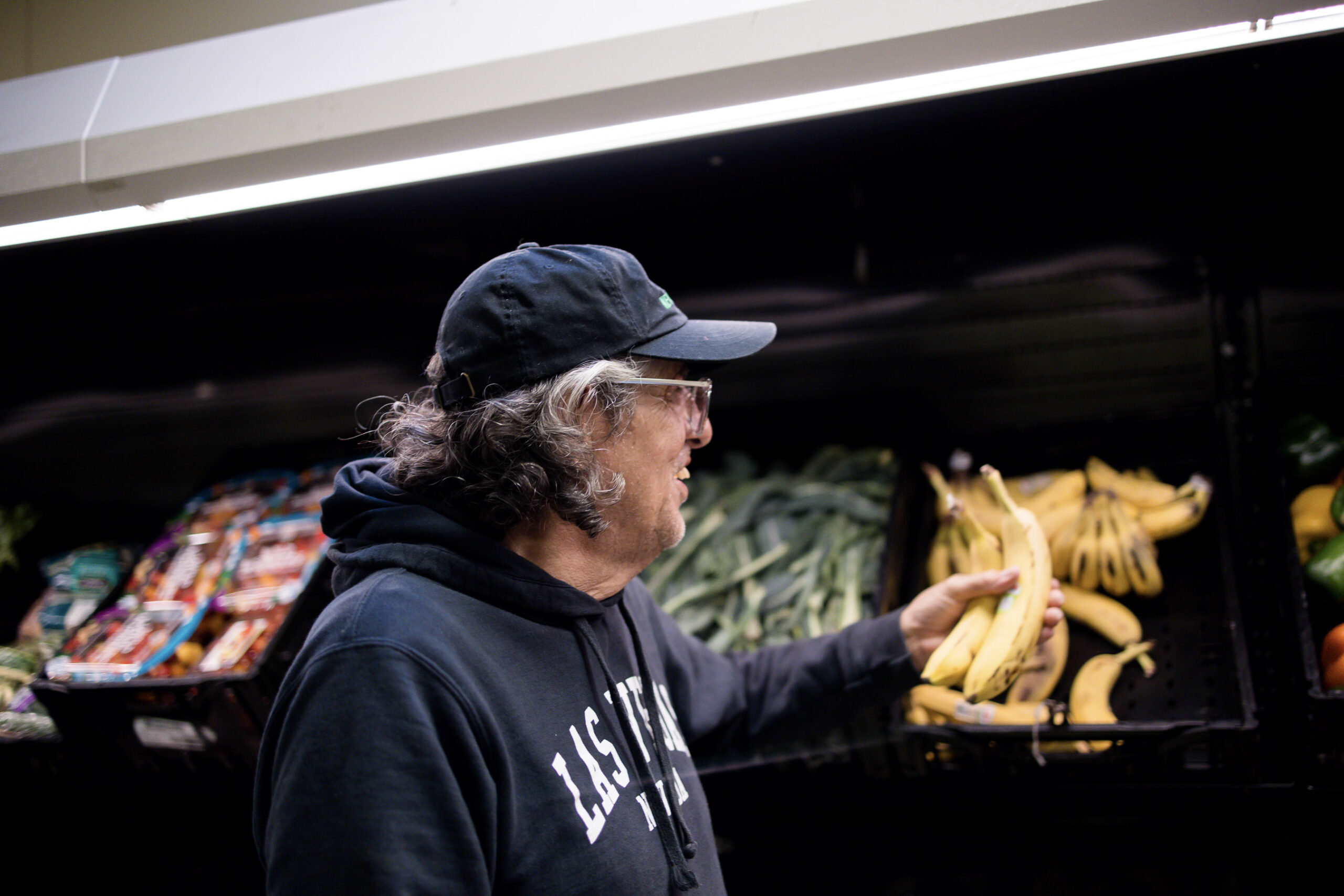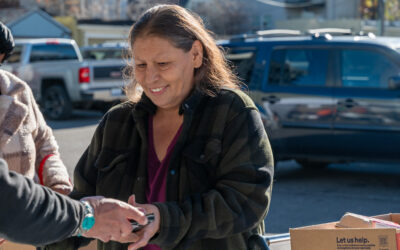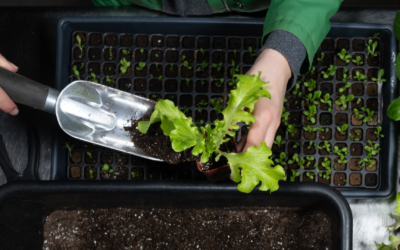By Rahma Diallo
Fifty years of food drives. Thousands of pantry visits. Millions of donated meals. And yet, hunger hasn’t gone anywhere. Instead, it’s become the background noise of American life, normalized and expected.
At Metro Caring, we’ve handed out groceries, welcomed volunteers, built coalitions, and welcomed neighbors for more than half a century. We’ve grown from a small downtown pantry into a place where people shop with choice, cook new recipes together, get help keeping their benefits, grow food in community gardens, and organize with their neighbors for better policy. But even as our work expanded, the problem hasn’t disappeared. In many ways, it’s only gotten more complex.
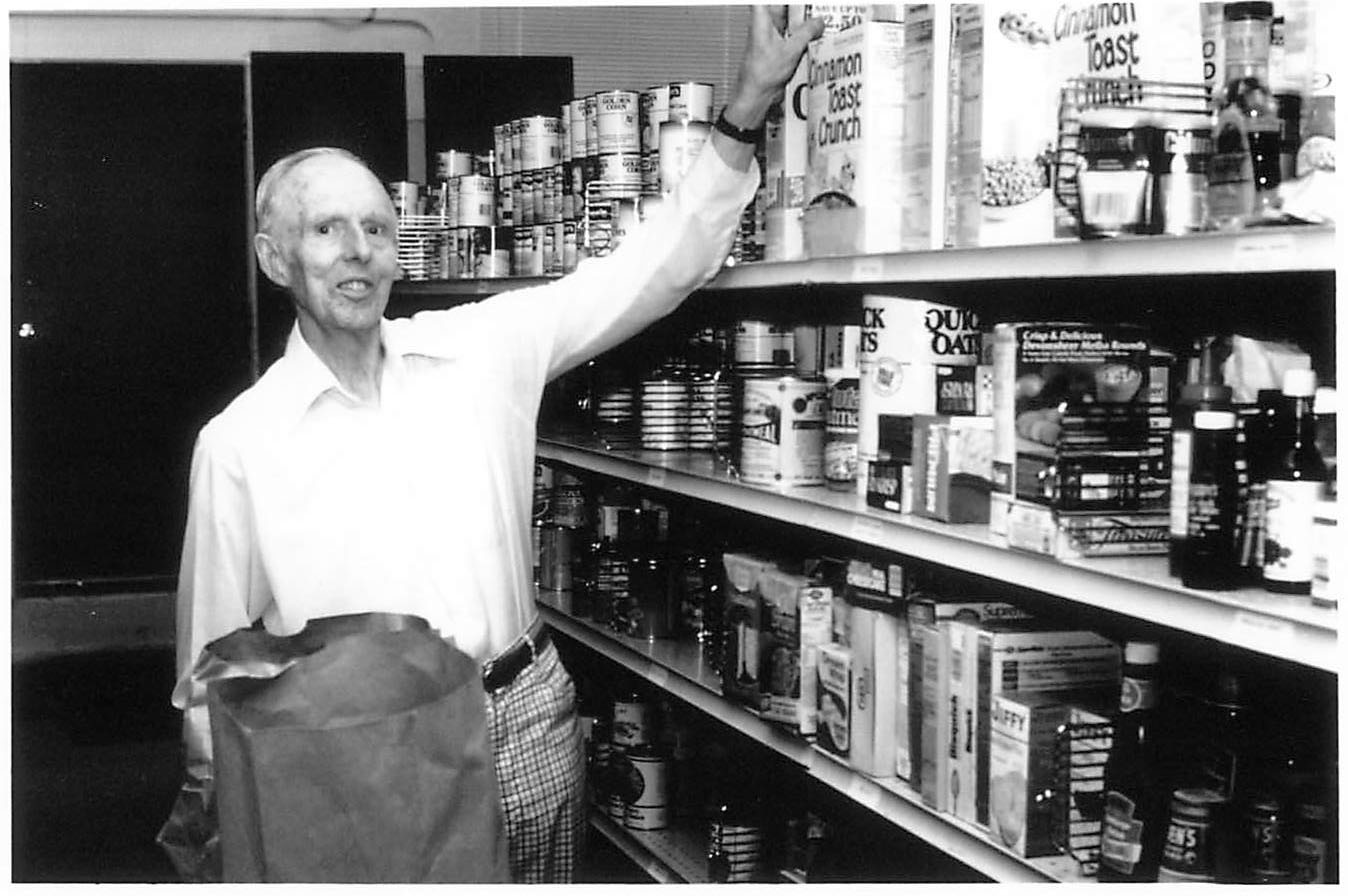
Volunteer Paul Griffith helped keep food storage accessible and orderly in the late 1980s.
As we reflect on 50 years of showing up, this moment feels like an invitation to look back, ask deeper questions, and get honest about what it will really take to end hunger for good. Because if decades of hard work, generosity, and community care haven’t permanently solved the problem, maybe it’s time to ask a different set of questions.
If we know how to feed people, why are we still fighting hunger?
We Nearly Ended Hunger. So, What Happened?
This might sound too good to be true, but for a brief period, the U.S. nearly proved hunger was solvable. In the late 60s, expanded government nutrition programs and school meals drove malnutrition down so sharply that people believed the crisis was behind us.
Then came the backslide. Corporate lobbyists encouraged the federal government in the 1980s to line their pockets with more money at the expense of working people. The Reagan administration cut outreach funding for the Supplemental Nutrition Assistance Program, often referred to as food stamps. Metro Caring found at the time that a third of SNAP-eligible households we served weren’t aware of the program.
The administration also added unnecessary work requirements to make it more difficult for people to receive funds to buy food. These work requirements are becoming more prohibitive today due to policy changes coming from the federal administration’s House Resolution 1, passed in July of this year.
On top of that, housing costs climbed while wages stalled. To fill the gap, charity scaled up, but the need kept growing faster than donations.
How Community Stepped In and What We Learned
As public benefits receded, community groups tried to hold the line. In Denver, that work took shape at Metro Caring: volunteers packing standardized sacks by family size, a single truck making pickups, rescued bread stacked in the basement. It was practical and generous but also unsustainable.
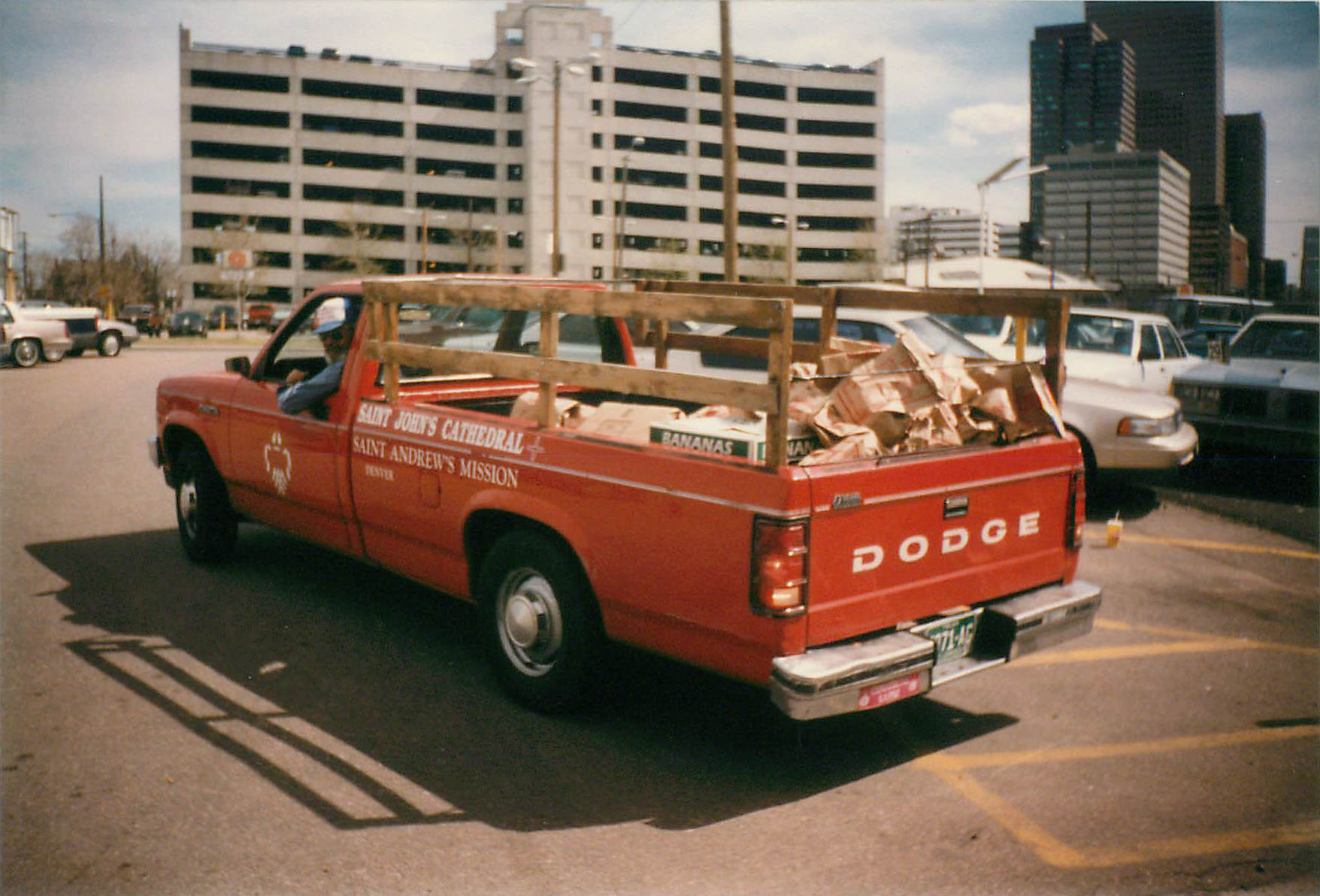
Longtime volunteer and former board member Susie Higginbottom remembers those Mondays, the steady rhythm of distribution, the small triumphs of stretching limited inventory, and the nagging question that grew over the years: Were we changing tomorrow or just getting people through today?
The line outside told its own story. Meeting the moment mattered but ending the pattern was another thing entirely.
So, the work changed. Pre-packed bags gave way to a choice-based market while canned goods made room for fresh and culturally relevant produce. The Fresh Foods Market became a place where people shopped with dignity and relationships replaced transactions. We also added benefits navigation, document support, nutrition and cooking classes, community gardens, and partnerships with local growers, while organizing alongside community to push on the systems that keep plates empty.
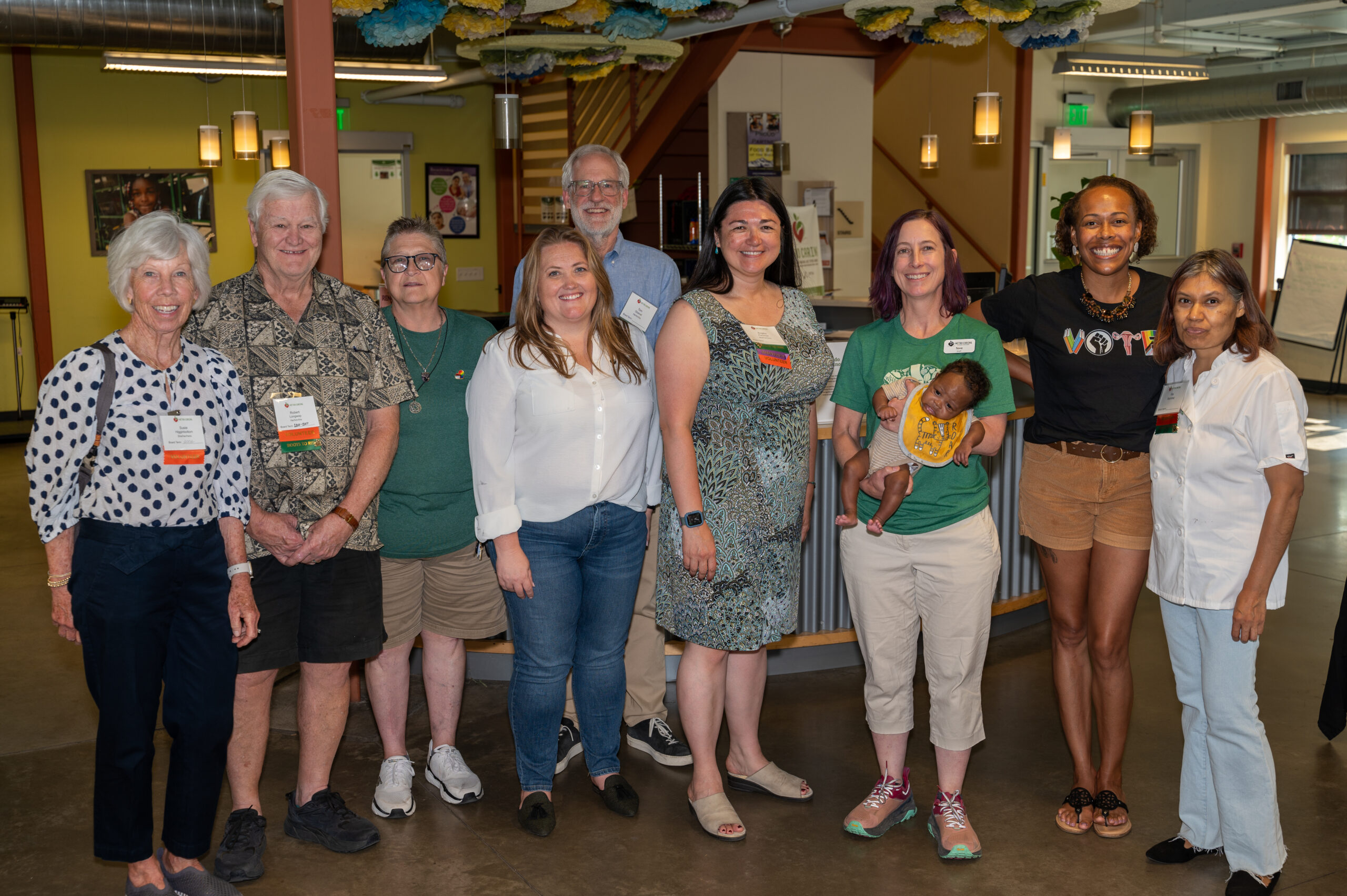
Susie Higginbottom, far left, joins other current and former Board of Directors in a 50th anniversary reunion at Metro Caring.
That evolution shows up in people like Danette Hollowell.
Danette first came to Metro Caring as a single mom looking for groceries. She found a market where she could choose the kinds of ingredients her family actually eats. Beyond the food, she also found classes and connections that helped her build community and, eventually, launch her own business.
She kept coming back, first as a shopper, then as a volunteer, and later as a voice shaping the work. Today, she serves on our board of directors.
“I’m proof that whatever they’re doing works,” Danette says.
Her path makes the lesson plain: Hunger isn’t a measure of effort. People can work hard, budget carefully, and still see full grocery carts lose to rent, medical bills, and wages that don’t keep up. Put next to Susie’s long view, Danette’s experience points to the same truth: The biggest obstacles aren’t inside the pantry. Unaffordable housing and healthcare, low paychecks, and a food system built only to profit large corporate grocery stores all keep people hungry.
“There’s this idea that hungry people aren’t working,” Danette said. “But most people who are hungry are kids, elders, people with different abilities—and a lot of creatives and students, too. We’re not linear people; you can’t flatten our lives into a stereotype.”
The numbers bear that out: according to the Economic Research Service, in 2023, nearly 1 in 5 U.S. households with children experienced food insecurity, and about 1 in 10 households with an adult 65 or older did as well.
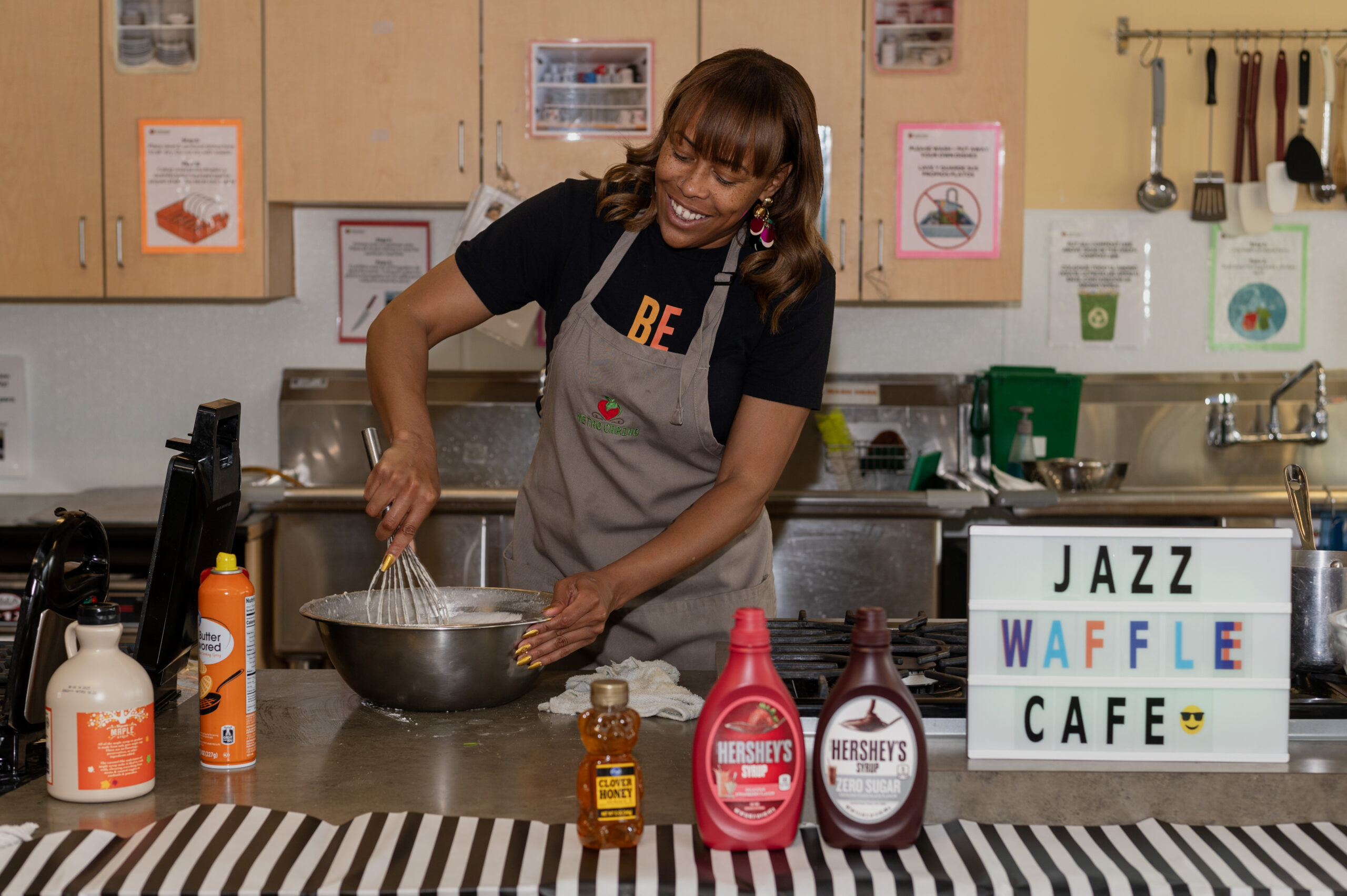
Danette whips up chicken and waffles in the Metro Caring kitchen for Volunteer Appreciation Week in 2024.
From Charity to Solidarity
Solidarity begins with listening first and building with, not for.
As Danette puts it, “You have to know about the community you serve,” and you only learn that by showing up alongside people.
helped create Baby Café at Metro Caring for new parents and their little ones to receive weekly lactation support. After just two years, the program has become a place for parents to find community, especially for folks who are new to Denver and looking to build relationships. As their children grow, parents in the program are hoping it can evolve to include help with introducing solid foods, like fruits and vegetables, to keep their toddlers healthy.
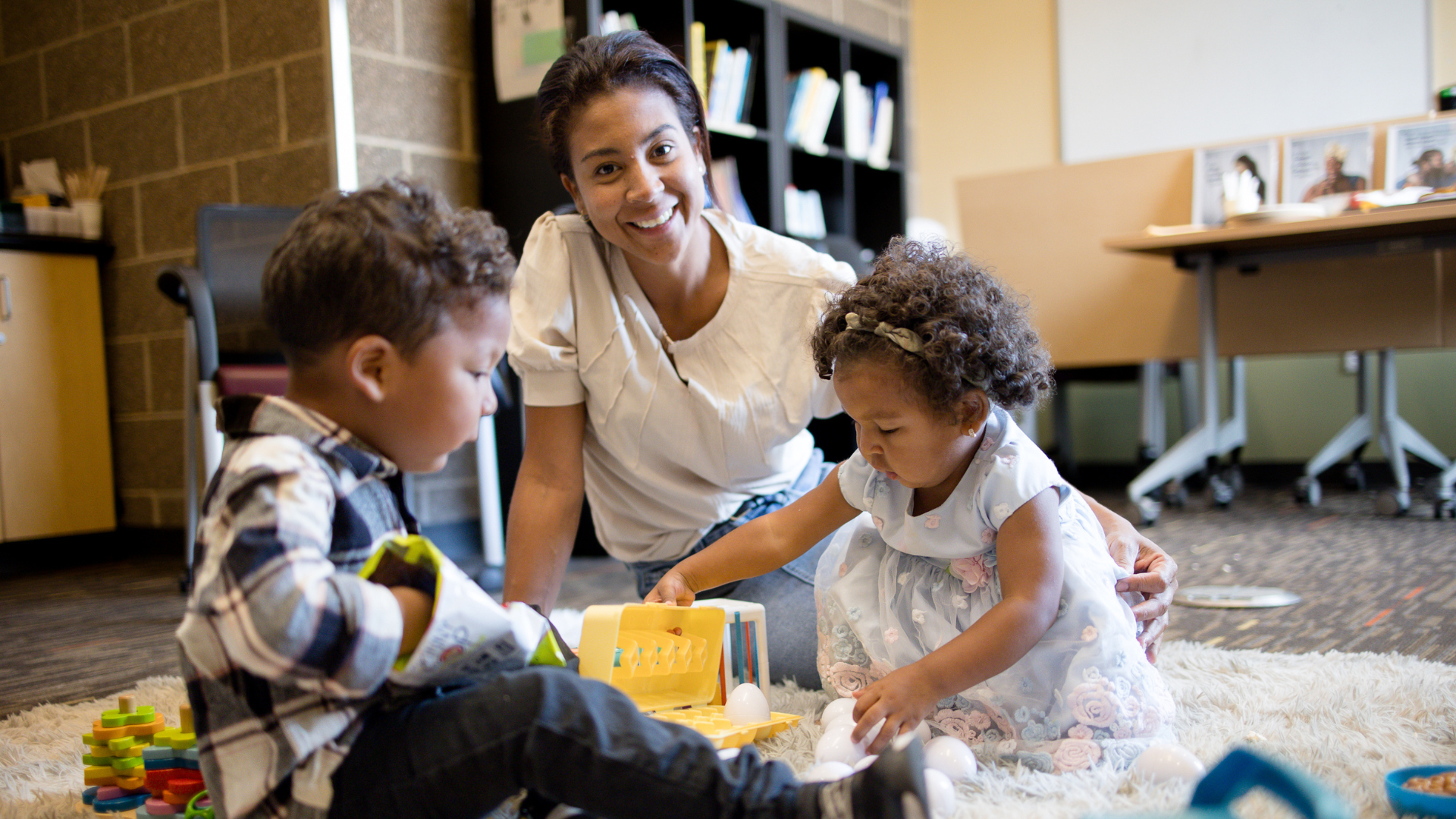
Held in partnership with Metropolitan State University and expert lactation consultants, Baby Café is a weekly lactation support group that is growing to include support for parents introducing their babies to solid foods. Photo by Sara Hertwig.
However, even with evolution, hunger endures because the headwinds are structural. Danette was blunt about it: there are folks trying to feed people, and others determined to take their cut first or to make sure no one gets help “for free,” even while they benefit from advantages they didn’t earn.
Danette’s arc puts a face to the shift: she came for groceries, found resources that fit her family, steadied her footing, launched a business, and now helps steer the ship.
“It’s a full-circle moment,” she told us. “I’ve become the person I needed 15 years ago, and I hope someone bumps into me in the hallway and moves in a better direction.”
What the Work Points To
When help meets proximity, it multiplies. Danette told us how that looks on the ground: “I help family members, loved ones, friends, people in my community. I know exactly how to get them in that line, get them an appointment, get them food on their table. So, that ability to give other people in my community food security is a really good feeling.”
Stability steadied her home and set things in motion: new skills, a business launch, and a voice others trust. That’s how solutions spread: neighbor to neighbor, then room to room, until the room has enough power to change the rules.
And the rules do need changing. As Susie puts it, people keep showing up because dignity today matters, but they also keep asking why families must need us tomorrow. That question points upstream: wages that match the cost of living, housing policies that don’t wipe out paychecks, healthcare people can actually afford, public benefits that catch folks before they fall, and a food system that values nourishment over margin. The lesson isn’t that charity failed; relief matters, but it can’t replace fair rules.
That’s why a focus on advocacy and policy has been part of Metro Caring’s work for decades. In the early 80s, we advocated for community members who were unlawfully denied their SNAP benefits. Staff and volunteers began monitoring food stamp officers in Denver. In just three months, we helped 5,000 people get their benefits reinstated.
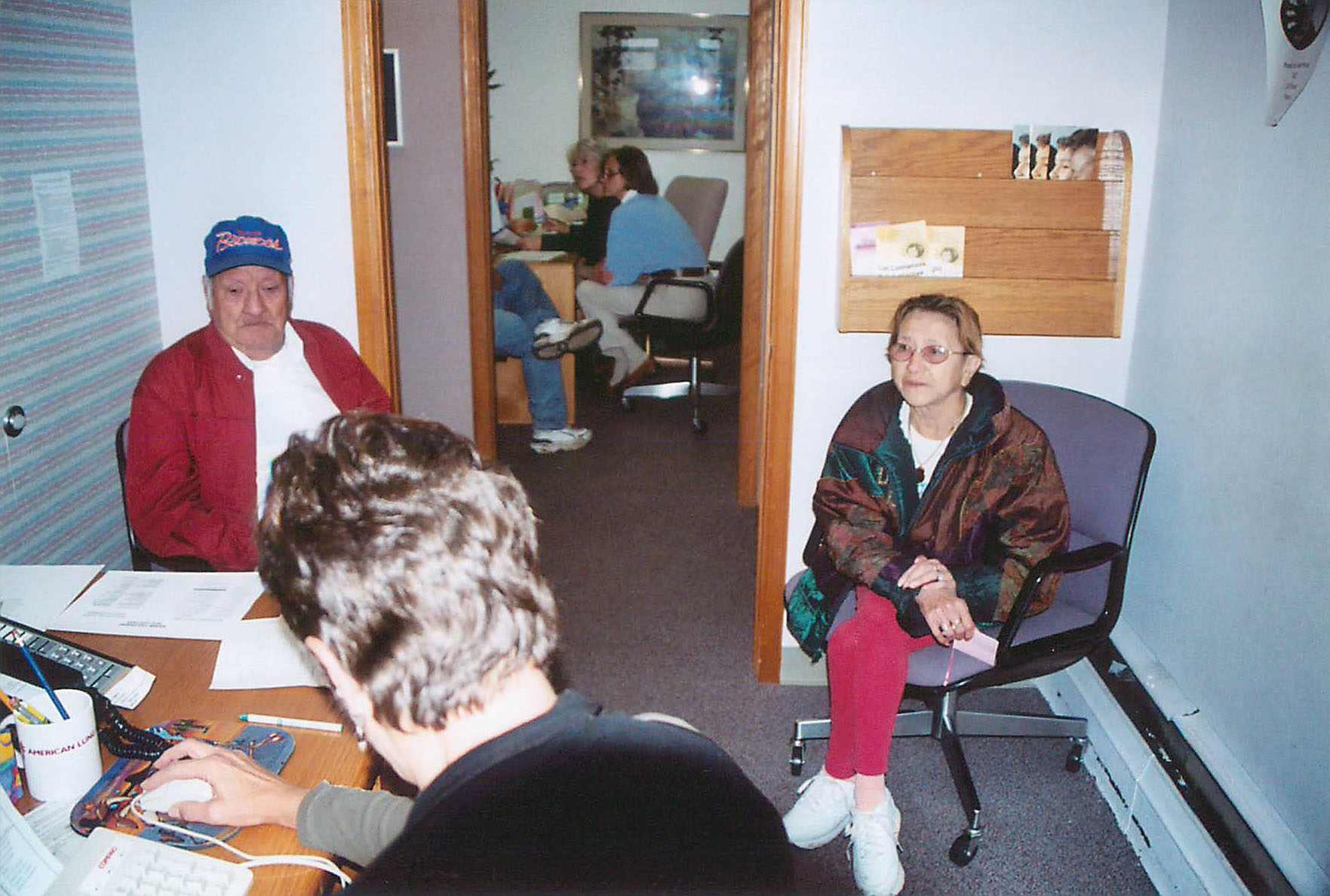
As Metro Caring (then Central Denver Community Services) helped people reinstate their SNAP benefits, we also recommended creating a watchdog program and lobbying group.
Now, the work takes shape with a full team of staff community organizers who are training, listening to, and mobilizing our community. As we identify the issues causing our community to go hungry, our Community Organizing team connects people to the issues they are affected by and then help them shape their story into compelling narratives and share them in spaces with policymakers and elected officials.
In 2025, we took members of our Diabetes Among Friends class to the Colorado State Capitol to testify in support of a Diabetes Prevention Bill that would make diabetes prevention more affordable. Our community watched as the bill passed the Senate committee and then celebrated when the governor signed it into law.
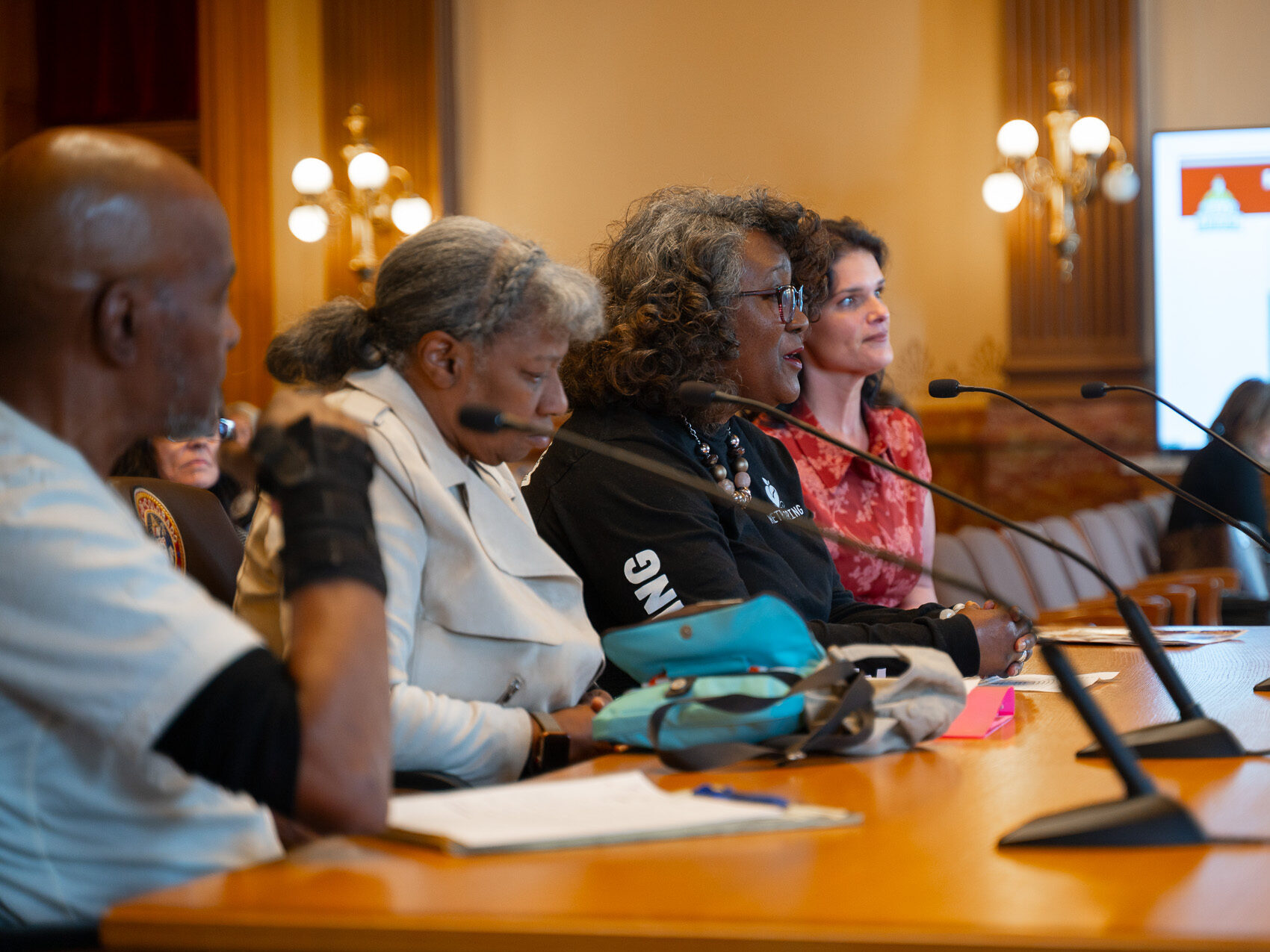
Members of our Diabetes Among Friends class visited the state capitol to testify in support of the Diabetes Prevention and Obesity Treatment Act. Photo by Brandon McKinley.
An Invitation to the Next Chapter
If hunger became “normal,” it was because we let the conditions that cause it to become normal. We don’t have to. Danette hopes the next person bumps into her in the hallway on the day they need a hand and leaves with more than a bag of food: a path, a friend, and a way forward. Susie hopes more people step into this work, because the line moves faster when the circle widens.
So here’s the invitation: keep feeding people and keep changing the conditions that make feeding necessary in the first place. Listen closer. Stand nearer. Back leaders with lived experience. And wherever you are, in a church basement, a city office, a kitchen, or a boardroom, use your seat to move the needle from relief to rights.
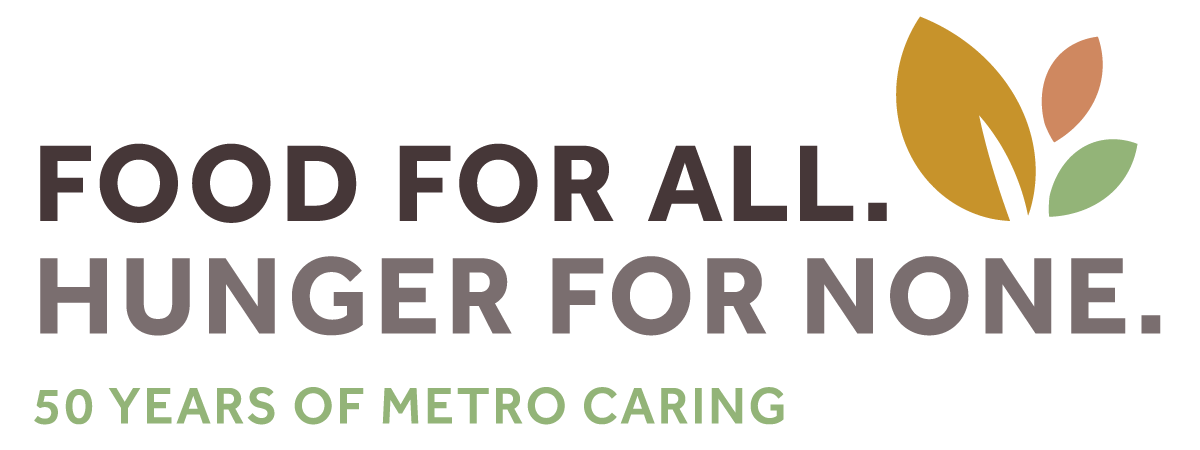
As we close the chapter on our 50th anniversary, you can learn more about Metro Caring’s history and our vision for the future: one that has food for all and hunger for none.

